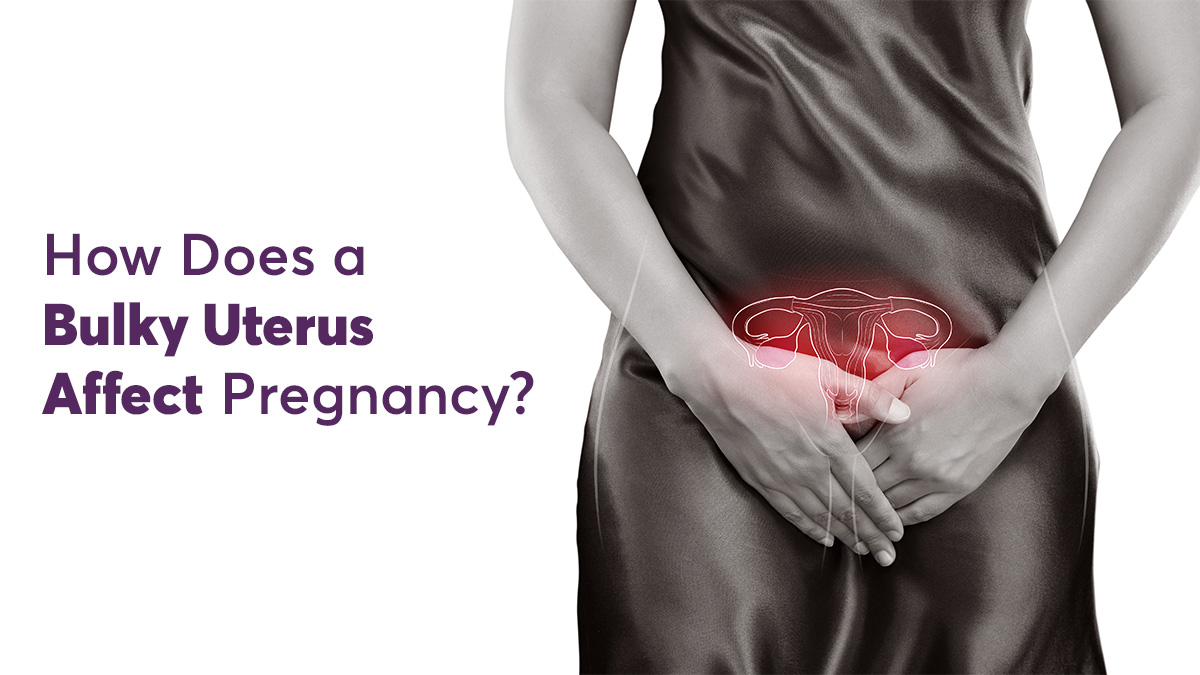Did you know that your uterus is designed to grow and expand as your baby develops during pregnancy? In fact, it is also normal for the uterus to expand a little during your periods. However, if this pear-shaped organ becomes abnormally enlarged, the condition is called bulky uterus. This condition can affect your ability to conceive and create problems during pregnancy. Several reasons can lead to the uterus being enlarged. But don’t worry. There are ways to ensure a healthy pregnancy even if you have a bulky uterus.
Causes of Enlarged Uterus
- The most common causes for a bulky uterus are fibroids and adenomyosis. Fibroids are non- cancerous tumors that form in the uterine muscle, On the other hand, adenomyosis is a swelling in the uterus that takes place when the tissue lining of the uterus (endometrium) begins to grow inside the muscular wall of the uterus. Hormonal imbalances can also cause a bulky uterus.
Risk factors commonly associated with fibroids include:
Age:
The risk of developing fibroids increases in women over the age of 35, which can cause the uterus to become bulky.
Family History:
Genetics plays an important role in the development of fibroids.
Obesity:
Obesity and a higher body mass index (BMI)
Symptoms and Diagnosis of a Bulky Uterus
Your symptoms will depend on the cause of the bulky uterus. For example, fibroids can lead to menstrual issues and abdominal pain, especially if they are large in size. Other symptoms of a bulky uterus include:
- Menstrual problems such as heavy or prolonged bleeding, bleeding between periods, large blood clots and painful periods that become worse over time.
- Some women experience pain in the pelvis, lower abdomen, back or legs. They may also experience pain during intercourse.
- Uterus issues can lead to difficulty in conceiving, miscarriage or premature delivery.
- You may experience bloating in your stomach. This is a feeling of fullness or pressure in the lower abdomen.
- Some women have urinary or bowel issues, like constipation, frequent urination, incontinence, and unexplained weight gain
The first step in diagnosing a bulky uterus is a pelvic examination. If the uterus appears to be larger than normal, your doctor will recommend a transvaginal ultrasound to confirm the diagnosis. In some cases, they could recommend an MRI to check specific areas of enlargement and thickening in greater detail.
How Does a Bulky Uterus Affect Pregnancy?
A bulky uterus can affect your ability to conceive and cause issues in delivery. Some women are unable to carry the baby to full term. Adenomyosis and fibroids can change the shape and contour of the uterus. This makes it difficult for the embryo to get implanted. This can also lead to inflammation, which leads to adverse conditions for fertilisation and embryo implantation.
If a bulky uterus is discovered in early pregnancy, it could lead to complications ahead. These may include obstructed labour, preterm labour, separation of placenta, fetal malpresentation, excessive bleeding during delivery or the need for a C-section delivery.
However, not all fibroids affect the chances of conception and pregnancy. It is best to consult your gynaecologist for a better understanding and the right treatment for bulky uterus & fibroids.
Managing Pregnancy with a Bulky Uterus
A bulky uterus is normal in early pregnancy, since your uterus will expand to accommodate the growing foetus. So, unless it is accompanied by other symptoms, there is no cause for concern. If you are planning to start a family, you can minimise the risks related with a bulky uterus by watching what you eat and drink.
Eating a healthy diet helps. Include lots of fruits and vegetables as well as healthy fats like avocados, nuts and olive oil. Do try to avoid processed foods, as these are high in sugar and salt. Drinking plenty of water helps to flush out toxins from your body and improves your overall health. Love your morning and even cups of coffee? It’s best to avoid caffeine, which is present even in tea, cola soft drinks and energy drinks. Do not drink any alcohol, as it can also cause hormonal imbalances.
While regular exercise is highly recommended, you must consult with your gynaecologist about how strenuous your workout should be. Yoga and other forms of exercise can help you maintain a healthy weight, which reduces the strain on your uterus. You can even try meditation or listening to music to reduce stress.
If you experience abnormal bleeding, consult your OB/GYN. They will perform a physical exam and recommend tests to determine the cause of your bleeding. If you have been diagnosed with any reproductive ailment, such as fibroids, it is best to consult your gynaecologist before pregnancy. This way, they can ensure timely treatment for a bulky uterus and fibroids.
Postpartum Considerations
After giving birth, your body will rapidly return to its pre-pregnancy state, and your uterus will lose half of its pregnancy weight within a week. You might experience mild cramping and other side effects, although pain medications, heating pads, and light exercise can help ease the discomfort. If the pain persists, consult your doctor.
Oasis Fertility has over 15 years of experience helping couples realise their dream of parenthood. Consult your nearest Oasis Clinic to learn more about the causes, symptoms and treatment of bulky uterus & fibroids. You can also have a live chat or call 1800-3001-1000 for immediate assistance.

